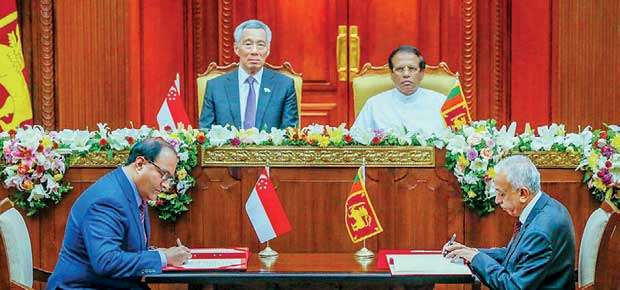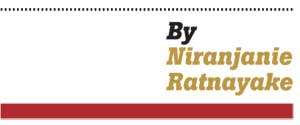Reply To:
Name - Reply Comment
Last Updated : 2024-04-18 07:50:00

The Institution of Engineers, (IESL) that I represent as its President, is a Professional Body, founded in 1906 and incorporated in 1968 through an Act of Parliament. Currently IESL consists of nearly 20,000 Members who are engineers, among whom are more than 5000 Chartered Engineers. 
IESL is the professional body in Sri Lanka that is now allowed to authorize the registration of engineering practitioners in the three categories of practitioners, viz. Chartered Engineers, Associate Engineers and Affiliate Engineers, under the Engineering Council Act of Sri Lanka of
March 2017.
We ensure the high quality of engineering services provided by our members for the sustainable development of Sri Lanka, by setting standards for required educational qualifications and competence levels for practice of engineering in Sri Lanka, conducting examinations and assessing educational qualifications and competence standards, and providing opportunities for continuous professional development.
So why are we so concerned as a Professional Body, about the Sri Lanka – Singapore Free Trade Agreement (SLSFTA) signed on 23rd January and came into effect from 1st May 2018? Trade liberalization is a stated policy of the Government, and we understand that they can be effectively used to attract Foreign Direct Investments (FDI) and develop a country.
In this SLSFTA, Sri Lanka and Singapore have liberalized trade in Goods, Services and other areas to certain extents. The full agreement, comprising 17 chapters (over 1000 pages), available at the website of the Ministry of Development Strategies and International Trade (MoDSIT), from 7th April 2018, is a very complex document.
Our emphasis is on Chapter 7, relating to Trade in Services, and its Annexes 7A and 7B, which are the Schedules of Commitments agreed on by Sri Lanka and Singapore respectively. The details of commitments as to which sectors of services are liberalized, and in which Mode/s and to what degree each of those service sectors is liberalized by each country are given in these ‘Schedules of Commitments’. Annex 7A gives the Schedules of Commitments by Sri Lanka, and Annex 7B gives the Schedules of Commitments by Singapore.
Annexes 7A and 7B contain the details of the commitments Sri Lanka and Singapore are making with respect to the Services sectors each country is liberalizing, and under which mode and the limitations on ‘Market Access’ and ‘National Treatment’ each country is offering to the other country.
I believe that, in order to understand the reasons for IESL having grave concerns about the SLSFTA, it is necessary to give a brief introduction to the concepts in Free Trade Agreements for ‘Trade in Services’ in general.
These are agreements prepared under the GATS (General Agreement on Trade in Services) framework developed by the World Trade Organization (WTO).
This is the first time that Sri Lanka has signed a bilateral Free Trade Agreement where ‘Trade in Services’ has been liberalized. Unlike agreements on ‘Trade in Goods’, these agreements could lead to very complex situations because people’s professions and livelihoods are getting affected at a national scale. These cannot be formulated and negotiated by merely a group of experts on international trade. Recognizing the complex situations that could arise in the case of trade in services, WTO has mentioned that unlike in the case of trade in goods, preparation of ‘trade in services’ agreements should have strong stakeholder participation.
We must remember that these Free Trade Agreements are negotiated between the two countries, based on the rules established under GATS Framework by the WTO. The two countries have the liberty to decide on which sectors are to be liberalized, in which Mode/s they would be liberalized, and any restrictions that they would bring in, within the main framework of GATS.
Unlike in Trade in Goods (under GATT framework), in the Trade in Services under GATS, the liberalization can take place with respect to ‘Market Access’ for the other party, and the way the other party is treated as equal to one’s own nationals (National Treatment). The services trade can take place in four different Modes, defined as
When liberalizing trade in services, the countries will agree on their commitments that cover all sectors that are liberalized, which are called ‘Horizontal Commitments’ and then go into the sector specific commitments which are called ‘vertical commitments’. Under both horizontal and vertical commitments, the countries have three options for limiting the degree of liberalization, . If the country decides not to liberalize a certain services sector, it will not appear in the vertical commitments section at all.
Thus, it can be seen that, initially, at the time of preparing the Free Trade Agreements, freedom is given for the two parties to include the specific services sectors that will be liberalized, to what degree the Market Access would be opened for the foreign party and to what extent the foreign investors will be treated as equal to one’s own nationals (National Treatment) under each Mode of trading in the schedules of Commitment.
"In order to negotiate services trade agreements, it is not enough to have specialists in International Trade and lawyers during the drafting stages of the documents. This is where the input from the Professionals in the respective sectors becomes extremely important"
Have our negotiations been effectively done to protect our Professionals and Younger Generation?
In order to do negotiate services trade agreements, it is not enough to have specialists in International Trade and lawyers during the drafting stages of the documents. This is where the input from the Professionals in the respective sectors becomes extremely important. They are the ones who know the intricacies of the services that are to be liberalized, which areas need to be strengthened with foreign inputs and which areas should be left for the local investors and entrepreneurs.
This is clearly seen when the Schedules of Commitments for Sri Lanka and Singapore (Annexes 7A and 7B respectively) are compared. As an example, in the horizontal commitments themselves (applicable to all sectors), Singapore schedule has the conditions for Mode 3 (Commercial presence) under National Treatment as: “A foreigner who wishes to register a business firm must have a local manager who should be a Singapore citizen or a Singapore Permanent Resident or a Singapore Employment Pass holder; at least one director of the company must be locally resident; all branches of foreign companies registered in Singapore must have at least 2 locally resident agents. (To qualify as locally resident, a person should be either a Singapore citizen or Singapore Permanent Resident or Singapore Employment Pass holder)”. Sadly, the Sri Lankan schedules do not have any such restrictions, either in the horizontal commitments or vertical commitments. In fact, even the first page that lists the Explanatory Notes of the Annexes 7A and 7B shows how loosely the Sri Lankan Schedules of Commitments have been prepared, compared to the Singaporean Schedules.
We do not object to the entry of new technologies and specialists required for the sustainable development of the country under proper controls, and built in conditions for knowledge and skill transfer. There are enough opportunities under the GATS framework to build in these limitations, which could have been exploited to the benefit of Sri Lanka, if the professionals were involved during the preparation of the Schedules of Commitments. However, the SLSFTA, is a total failure, prepared without the input of key Professional Bodies, completely ignoring the concerns of the Professionals with regard to the unfair competition and lack of opportunities for the local Professionals to get the advantage of the expected new investments in the country. This agreement will lead to brain drain and unrest among the young generation of engineers in particular, who will be graduating from our Universities at an annual rate exceeding 1800. We vehemently object to the SLSFTA in its current form. We see this as a lost opportunity for the Sri Lankan Government to increase the Foreign Direct Investments and develop the country in a sustainable manner, using a correctly formulated and executed Free Trade Agreement with Singapore.
kumar Saturday, 19 May 2018 01:51 PM
for years we are used to frighten people with ghost stories and miss the bus. Agreements can always be changed amended or abandoned. Now you have an opportunity pls don,t play politics, we have missed opportunities. It will also give your legal experts who are just novices to learn the intricacies of International agreements and consequences.

Add comment
Comments will be edited (grammar, spelling and slang) and authorized at the discretion of Daily Mirror online. The website also has the right not to publish selected comments.
Reply To:
Name - Reply Comment
On March 26, a couple arriving from Thailand was arrested with 88 live animal
According to villagers from Naula-Moragolla out of 105 families 80 can afford
Is the situation in Sri Lanka so grim that locals harbour hope that they coul
A recent post on social media revealed that three purple-faced langurs near t